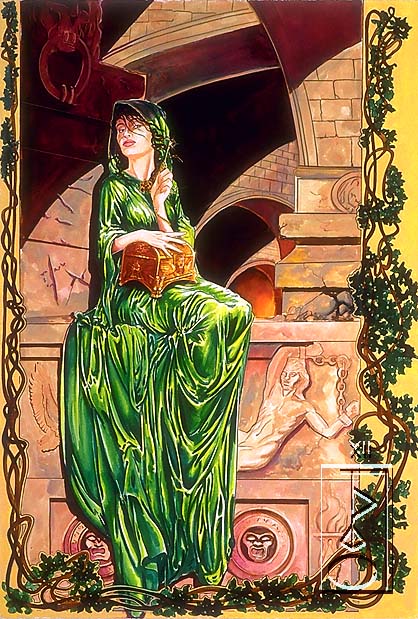 Bards of Elanthia there is much ye must know; Duties ye have to this land where we dwell; Your life be not just for the pleasure of show; Your duties be solemn, so listen ye well. Seekers of truth, ye reveal the gods' gifts; Guide others to learn respect for all things; Keepers of lore, both legend and myth; Make sure ye spread knowledge where ere your song rings. And last but not least ye are bringers of joy; Both during the hunt and resting round hearth; Make sure that all relish the verse ye employ; Whether joyful, or mournful, tis song's one true worth. ...As remembered by Elaerina Cragsinger Thus, as the song says, bards are seekers of truth, keepers of lore and bringers of joy. Bards are multitalented, often also taking to the field as warriors or spell casters, or spending time with rogues picking boxes. We have brethren in Onoir who specialize in each of these areas, and we urge ye to read those codes as ye will undoubtedly need them. However, in these codes, we will address only that which is unique to bards. As seekers of truth, bards are given the ability to determine the true worth and power of many of the gods' creations. Even our song of purification simply reveals the hidden potential of a gem. With this ability comes duty. We do not mean that bards must sing for everyone who asks. This would simply not be possible. Rather, when we do sing, we must honor that which is unique in each object - with loresongs just as singular. How can we teach others to respect the beauty of the gods' creations if every loresong we sing is identical, regardless of the item? On a more practical note, other professions will also stop respecting us if we simply sing meaningless, repetitive blather. A traditional duty of bards is also that of lorekeeper. Again, not all bards will choose this route. For those who do, however, we have some strictures. Make sure that your songs accurately reflect the deed of which ye are singing and the time and milieu in which the song was sung. We as songsmiths can leave no greater heritage than verse that not only promotes our history, but also infuses our audience with the emotions that were present in a time long gone. In a related vein, we believe that it is the responsibility of experienced bards to serve as mentors and role models to young bards whenever possible. Loresinging takes hard work and practice before each of us learns to develop our own personal flair. Distinguished bards can serve as valuable allies in this process - without giving all their secrets away! As bards, we bring joy to others through our songs. We can inspire groups to hunt well, and can create items of great power with our voices. When resting or when hunting, our songs can be happy, sad, funny, or inspiring. When our songs are sung at the right time and in the right place, they are truly a gift to others. However, we must remember that there are many in Elanthia for whom song does not bring joy, and we must respect these folks as well. Singing in busy rooms where clerics, empaths and rogues ply their trades is disruptive, no matter how wonderful the song. Aye, it can even cost a life! Ye will probably find that your best creations find only lukewarm reception in these rooms, and that lesser works can engender true hostility. Sing with flair, sing with abandon, and sing with heart... but sing also with consideration. This last item saddens us to include, but we have heard some bards sing songs best left to... (shudder)... other ethers. Your song is a reflection of your soul. It should be, above all things, original. Remember: joyous song is our gift. We must use it to enhance this land, not to degrade it. These Bardic Codes Submitted by Lady Elaerina and Lady Aureellia. |
Professional Codes >
